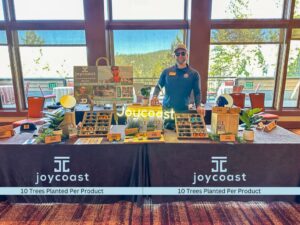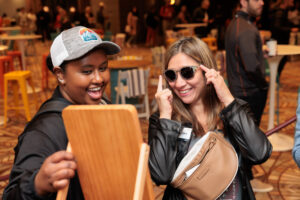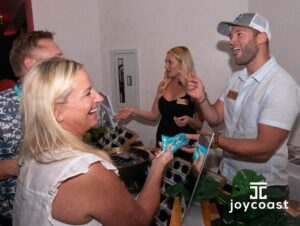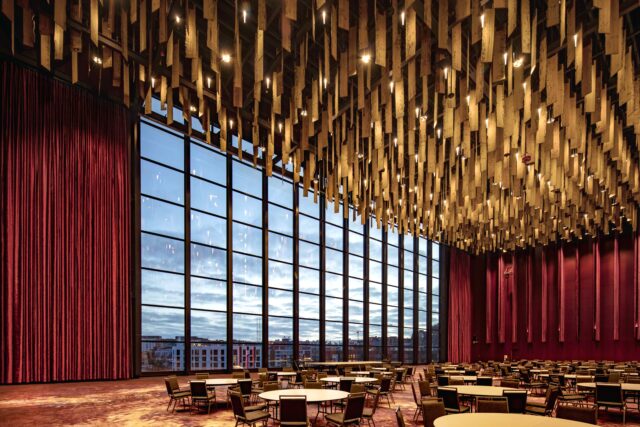 Prevue talks with the founder of Joycoast, a corporate gifting provider that takes green gifting to new heights.
Prevue talks with the founder of Joycoast, a corporate gifting provider that takes green gifting to new heights.
Providing beautiful merch that participants love to show off has been an incentive staple for a long time, but now there’s a growing trend toward making sure those logo’d gifts are consistent with a company’s sustainability goals.
Yes, green gifting is a growing trend, and a whole new breed of gifting providers is popping up to provide merch that is sustainable in multiple ways. Take Joycoast, for example. Joycoast is a sustainable corporate gifting provider that crafts gorgeous, eco-friendly wooden accessories like sunglasses, watches and wallets that participants will cherish — and the company plants 10 trees for every product sold.
 Prevue recently spoke with Joycoast’s Founder Reese O’Toole to learn more about how his company provides green gifting experiences both on site and virtually, as well as directly shipping customized, logo’d products directly to participants.
Prevue recently spoke with Joycoast’s Founder Reese O’Toole to learn more about how his company provides green gifting experiences both on site and virtually, as well as directly shipping customized, logo’d products directly to participants.
Prevue: Participants at the Meet Well Summit at the Sunseeker Resort in Charlotte Harbor, Fla., this August will get to check out the merch themselves with one of your on-site experiences, but for those who can’t make it, tell us a bit about what makes your green gifting products different from the usual totes and tees.

O’Toole: We’re a premium gifting supplier, so our gifts are high quality. But it’s the sustainability piece that really piques our meetings and events clients’ interest. Companies now have their own sustainability goals, and they want to choose more sustainable vendors that can help them reduce their emissions and overall make their event more eco-friendly. But while it’s the sustainability of our products that first catches their attention — our wide assortment of watches, sunglasses and other products are made of wood, rather than metal and plastic, and we are committed to planting 10 trees for every product we sell — it’s the quality of the products themselves that seal the deal.
Prevue: How did you get the idea to start Joycoast?
O’Toole: Entrepreneurship is in my DNA — my dad and grandfather were both lifelong entrepreneurs, and I majored in entrepreneurship in college. After college, I took a sales job in Chicago, but kept my eyes open for an opportunity. I’ve always believed that companies should value sustainability, so weaving sustainability into any new business was always in the back of my mind.
I never wore watches because having a chunk of metal on my wrist just didn’t do it for me. But then I learned that you could make lightweight watches out of wood that are sustainable because they’re created from a natural, renewable resource, and they’re beautiful and unique. Why is everyone not wearing these? I did some research, and I thought that lightweight wooden watches, which have been around for decades, just needed to be modernized. So I started designing different styles of watches in different types of wood with different faces and found someone who could make them for me.
 Then I started going to consumer events in the Chicago area, like craft and art fairs and street festivals, and people loved our watches — and our mission to plant 10 trees for every product sold. So we started adding sunglasses, wallets and rings. Then our customers at these fairs started telling us that they would love to be able to offer our products at their sales meetings, so we started bringing our on-site experience to events, and the word started spreading, so we started going to industry meetings such as IMEX and now Prevue’s Meet Well Summit.
Then I started going to consumer events in the Chicago area, like craft and art fairs and street festivals, and people loved our watches — and our mission to plant 10 trees for every product sold. So we started adding sunglasses, wallets and rings. Then our customers at these fairs started telling us that they would love to be able to offer our products at their sales meetings, so we started bringing our on-site experience to events, and the word started spreading, so we started going to industry meetings such as IMEX and now Prevue’s Meet Well Summit.
So basically, our customers brought us to the incentive business, and sales meetings, incentive trips, golf tournaments and client appreciation events are now our primary focus, though we still offer direct to consumer as well.
Prevue: It’s so interesting that you design the watches yourself — how do you figure out what watch designs will resonate with people?
O’Toole: I talk to people all the time at consumer and corporate events to find out first-hand what they like. I find the feedback I get from people to be so valuable, and I love being able to put that feedback into action with the designs of our watches, sunglasses and other products. I really enjoy being able to offer really cool, unique and fun designs.
Prevue: What are the benefits of having the on-site experience?
 O’Toole: It used to be that a gifting company would just provide, say, a few styles of plastic sunglasses with the company’s logo on the side. But now companies are realizing that the gift means more when it’s customized, when the participant can pick something for themselves, they feel more appreciated. And they wear it more because they pick out the style that best suits them. And they can tell the story about how this experience of letting 100 attendees choose their own gift resulted in 1,000 trees being planted. For a small setup fee, we provide the tablecloths and the appropriate number of staff to man the tables. We can scale up or down as needed, from 50 people to hundreds. And we can bring speakers and play music and make the experience a lot of fun — we’re called Joycoast for a reason.
O’Toole: It used to be that a gifting company would just provide, say, a few styles of plastic sunglasses with the company’s logo on the side. But now companies are realizing that the gift means more when it’s customized, when the participant can pick something for themselves, they feel more appreciated. And they wear it more because they pick out the style that best suits them. And they can tell the story about how this experience of letting 100 attendees choose their own gift resulted in 1,000 trees being planted. For a small setup fee, we provide the tablecloths and the appropriate number of staff to man the tables. We can scale up or down as needed, from 50 people to hundreds. And we can bring speakers and play music and make the experience a lot of fun — we’re called Joycoast for a reason.
But we’re very flexible in how we work with customers. If they want to facilitate their own mini-gifting experience, they can order a number of each style and have customized cases sent to their event. We also can create a virtual landing page where attendees can come to the site, enter a redemption code and pick a product, which we then would brand and ship to the individuals. We want to make it as easy as possible for the event planners, because they have enough going on!
Prevue: Tell us a bit more about the tree-planting piece — how many have you planted so far, and how do you ensure that the program is truly sustainable?
O’Toole: We have planted about 80,000 trees so far, which is pretty cool, but my goal is to get to a million trees in the next two years, as well as reduce the amount of harmful, single-use plastics in the environment.
Most of the wood we use to make our products comes from Africa — we source all the wood we use from Forest Stewardship Council-certified forests — so that’s where we replant trees as well. We work with a couple of partner companies that use the forest garden approach. They teach impoverished farmers in Africa how to grow a forest garden that will feed their families and provide surplus they can take to market to create an additional source of income that they then spend within their community. So it really uplifts the whole community.
You May Also Be Interested In…
Sustainability Report: Still MIA in RFPs
LEED Certification at U.S. Convention Centers Ticks Up
A Solution for Sustainable Swag










